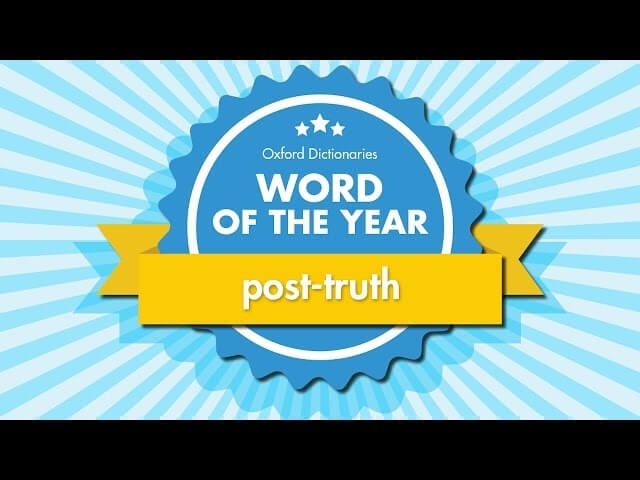“Post-truth” is the word of this sick, sad year, Oxford Dictionaries says

The year 2016 has seen its share of high-profile casualties: David Bowie, Leonard Cohen, Gene Wilder, Prince, Muhammad Ali, and now the truth. This last death notice comes courtesy of Oxford Dictionaries, which has named “post-truth” as its word of the year. Despondent journalism teachers around the world should probably turn in their belts and shoelaces right now. According to the Oxford experts, the truth was smothered to death sometime during this tense and emotional year, featuring Britain’s highly publicized exit from the European Union in June and reality TV star Donald Trump’s improbable victory in the U.S. presidential election in November.
Most of the other candidates on Oxford’s Word Of The Year 2016 shortlist were equally depressing: “coulrophobia” (i.e. fear of clowns), “Brexiteer,” “adulting,” “chatbot,” “alt-right,” and “woke.” That was the kind of year 2016 was.
Ultimately, it was “post-truth” that emerged triumphant from the pack. Officially, it means “relating to or denoting circumstances in which objective facts are less influential in shaping public opinion than appeals to emotion and personal belief.” In its announcement, Oxford gives a pocket history of the term, tracing it back to a 1992 essay that Steve Tesich wrote for The Nation about the Iran-Contra scandal and the first Persian Gulf conflict. There was even a book by Ralph Keyes called The Post-Truth Era in 2004. But 2016 was the year that “post-truth” politics truly came of age, especially in stories related to Brexit and Trump.
Oxford also acknowledges Stephen Colbert’s neologism “truthiness,” which was Merriam-Webster’s pick for Word Of The Year back in 2006. Apparently, things have only gotten worse for the truth in the ensuing decade.
[via BBC]